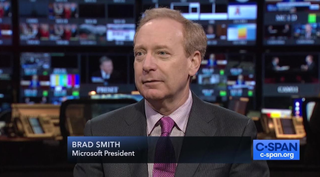Microsoft's Brad Smith: We Need More Tech Regulation

Microsoft president Brad Smith is calling for more regulation of tech companies. He said those businesses need to step up and provide more self regulation, but "we do think we need more regulation of technology."
Smith, who has co-written a new book, Tools and Weapons, was appearing on C-SPAN's Communicators series to promote the book and talk about Big Tech in both those contexts. "The world has questions and we need to answer them," he said.
Computer giants, though mostly the edge providers like Facebook and Google, have been under intense scrutiny in D.C. over their size and power.
Smith said that digital technology has gone longer with less regulation than almost any other technology since the 1800s. "We think that the market, customers and even industry itself would be better served, for the long term, with a different balance."
Some critics of more regulation of tech say Washington doesn't have the computer smarts to get that right.
He said that given that the government is able to regulate airplanes, which are basically computers with wings, and cars, which are basically computers with wheels: "We have people in Washington who are perfectly capable of regulating computers that don't move at all." He said in the balance of rules and self-regulation, he would like to see a "healthy dose" of the former.
Smith said his company would like to see a strong national privacy law, and has been advocating for that for years. He gave a shout out to California's new privacy law, which he said was a good thing, at least in terms of bringing the debate to Washington.
Broadcasting & Cable Newsletter
The smarter way to stay on top of broadcasting and cable industry. Sign up below
In the next decade, that privacy pact needs to become global, he said. Smith said he was "pretty enthusiastic" about the EU's General Data Protection Rules (GDPR), an enthusiasm not shared by some others in the tech sector.
Smith conceded that his company is not involved with monetizing data as the big edge players, but he said that his company's support of privacy regs stems from its belief that the market works best, and companies in it, will succeed the most if consumers have confidence.
Another area where laws are needed, he said, is AI and facial recognition, which he called one of the big issues of this decade, where a government can use cameras and computers and facial recognition to identify everyone who walks down the street. "A very important question in the U.S. is when should law enforcement be able to use this technology, say, to follow you everywhere you go. We would say probably by getting a search warrant from a court." In any event, that needs to be a debate that is happening now, he said.
Asked about the cost of securing its services, Smith said Microsoft spends a billion dollars a year on security for its cloud data centers, including on 3,000 engineers. He said the most cybersecurity attacks have been coming from Russia, North Korea and Iran, especially ones on civilian infrastructure and electoral processes.
Smith said Microsoft wants to participate in the Chinese economy in a thoughtful way that is focused on national security and human rights. In his book, Smith said his company does evaluate a company on many things, including concerns about corruption risks and human rights, before opening a data center.
Microsoft does put data centers in China, but not its consumer services. For example outlook.com is not in China because, Smith said, "we don't feel we can strike the right balance in terms of human rights."
The interview airs on C-SPAN Saturday, Feb. 1, at 6:30 p.m. ET and on C-SPAN2 Monday, Feb. 3, at 8 a.m. and 8 p.m.
Contributing editor John Eggerton has been an editor and/or writer on media regulation, legislation and policy for over four decades, including covering the FCC, FTC, Congress, the major media trade associations, and the federal courts. In addition to Multichannel News and Broadcasting + Cable, his work has appeared in Radio World, TV Technology, TV Fax, This Week in Consumer Electronics, Variety and the Encyclopedia Britannica.

